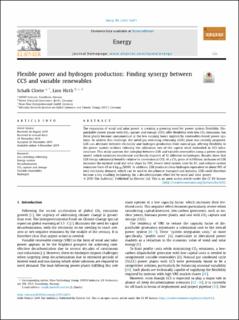| dc.contributor.author | Cloete, Schalk Willem Petrus | |
| dc.contributor.author | Hirth, Lion | |
| dc.date.accessioned | 2020-06-12T08:17:09Z | |
| dc.date.available | 2020-06-12T08:17:09Z | |
| dc.date.created | 2020-01-13T13:17:34Z | |
| dc.date.issued | 2020 | |
| dc.identifier.citation | Energy. 2020, 192 . | en_US |
| dc.identifier.issn | 0360-5442 | |
| dc.identifier.uri | https://hdl.handle.net/11250/2657829 | |
| dc.description.abstract | The expansion of wind and solar power is creating a growing need for power system flexibility. Dispatchable power plants with CO2 capture and storage (CCS) offer flexibility with low CO2 emissions, but these plants become uneconomical at the low running hours implied by renewables-based power systems. To address this challenge, the novel gas switching reforming (GSR) plant was recently proposed. GSR can alternate between electricity and hydrogen production from natural gas, offering flexibility to the power system without reducing the utilization rate of the capital stock embodied in CCS infrastructure. This study assesses the interplay between GSR and variable renewables using a power system model, which optimizes investment and hourly dispatch of 13 different technologies. Results show that GSR brings substantial benefits relative to conventional CCS. At a CO2 price of €100/ton, inclusion of GSR increases the optimal wind and solar share by 50%, lowers total system costs by 8%, and reduces system emissions from 45 to 4 kgCO2/MWh. In addition, GSR produces clean hydrogen equivalent to about 90% of total electricity demand, which can be used to decarbonize transport and industry. GSR could therefore become a key enabling technology for a decarbonization effort led by wind and solar power. | en_US |
| dc.language.iso | eng | en_US |
| dc.publisher | Elsevier | en_US |
| dc.rights | Navngivelse 4.0 Internasjonal | * |
| dc.rights.uri | http://creativecommons.org/licenses/by/4.0/deed.no | * |
| dc.subject | Gas switching reforming | en_US |
| dc.subject | Energy systems | en_US |
| dc.subject | Decarbonization | en_US |
| dc.subject | CO2 capture | en_US |
| dc.subject | Hydrogen | en_US |
| dc.title | Flexible power and hydrogen production: Finding synergy between CCS and variable renewables | en_US |
| dc.type | Journal article | en_US |
| dc.type | Peer reviewed | en_US |
| dc.description.version | publishedVersion | en_US |
| dc.rights.holder | © 2019 The Author(s). Published by Elsevier Ltd. This is an open access article under the CC BY license (http://creativecommons.org/licenses/by/4.0/). | en_US |
| dc.source.pagenumber | 11 | en_US |
| dc.source.volume | 192 | en_US |
| dc.source.journal | Energy | en_US |
| dc.identifier.doi | 10.1016/j.energy.2019.116671 | |
| dc.identifier.cristin | 1771422 | |
| cristin.ispublished | true | |
| cristin.fulltext | original | |
| cristin.qualitycode | 2 | |

